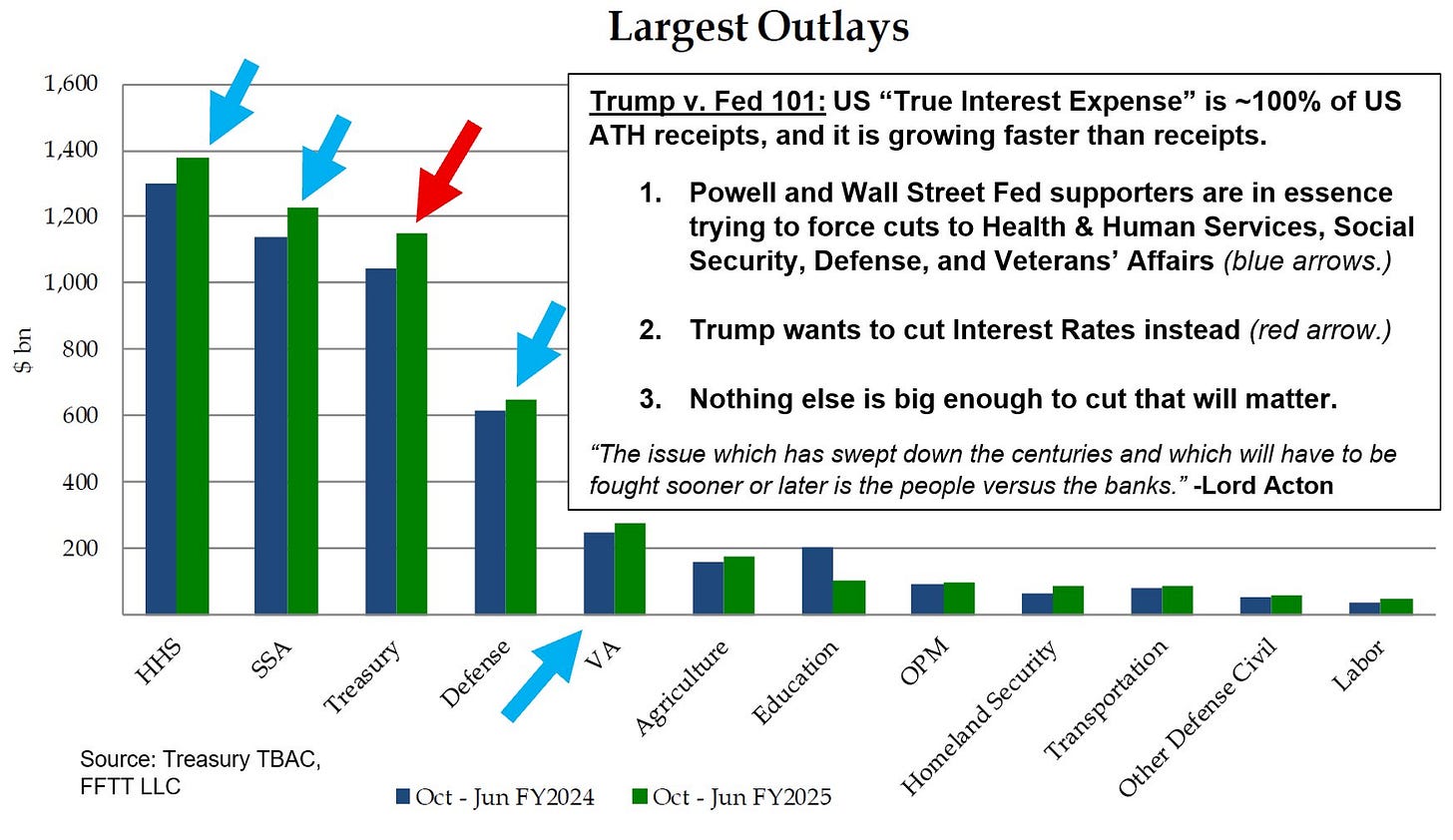Ten31 Timestamp 916,643
As Congress undertakes its semiannual ritual of government shutdown theater, a few interesting signposts hit the wire this week highlighting the unique set of circumstances the US is currently confronting. Most notably, Nvidia and OpenAI inked an eye-watering (and possibly circular) $100 billion investment / chip supply deal aimed at deploying at least 10 GW of GPUs to support continued growth (and, indirectly, capital gains tax revenue) in what has quickly become a geopolitically crucial sector. Elsewhere, South Korean industrial giant Hyundai Heavy Industries is reportedly in talks to take over at least one US shipyard to help ameliorate domestic shipbuilding deficits – the latest in a string of similar headlines that have cropped up over the past few weeks pointing to major American defense capacity shortfalls. Finally, the head of the Social Security Administration suggested “everything is being considered” to save the program from insolvency, before walking that back in a matter of hours and reaffirming that an increase to the retirement age will not be discussed.
Against the backdrop of compute demand that (for now) can’t be satiated, ships that can’t be built, and retirement benefits that can’t be touched, various Fed officials spent the week subtweeting each other with public statements pointed in opposite directions on the path of interest rates. In his first speech since joining the central bank’s Board of Governors, aspiring global trade architect and occasional bitcoin enjoyer Stephen Miran openly pushed for benchmark rates closer to ~2.5%, nearly two points lower than the current range, while many of Miran’s new coworkers took to CNBC to suggest rates are more or less just fine where they are. For our part, with the US increasingly engaged in an AI arms race where the numbers get loftier by the day, the military struggling to replenish its defense base absent foreign intervention – despite all-time high defense outlays – and public spending on retirees remaining politically untouchable, the whole rates conversation continues to feel like trying to fight against a decision path that has long since been baked in the cake over decades of policy decisions across many (blue and red) administrations. The recent unabated upward momentum for gold suggests the market is starting to agree.
Portfolio Company Spotlight
Strike is an emerging fintech and payments innovator leveraging bitcoin and the lightning network to allow consumers and merchants around the world to accumulate bitcoin while sending and receiving payments instantly and cheaply in a wide variety of settings. Strike’s offerings include a consumer app – now available in nearly 100 countries including the EU – for bitcoin purchases, bitcoin-backed lending, P2P payments, global remittances, and more. Strike also offers a suite of APIs for merchants and enterprises to easily benefit from lightning’s low cost, near-instant settlement. The company has announced a variety of exciting new features over the past year and continues to have one of the most robust pipelines of upcoming launches in the bitcoin ecosystem.
As the world’s largest investor focused entirely on bitcoin, Ten31 has deployed $200 million across two funds into more than 30 of the most promising and innovative companies in the ecosystem, and we expect 2025 to be the best year yet for both bitcoin and our portfolio. Visit ten31.xyz/invest to learn more and get in touch to discuss participating.
Selected Portfolio News
Fold announced its collaboration with fintech leader Stripe as part of its upcoming credit card rollout:
OpenSecret’s Maple AI is now available in beta on Android:
Strike added lending for customers in North Dakota:
As well as virtual USD for business accounts:
Media
Ten31 Managing Partner Matt Odell led a conversation on the growing importance of freedom-oriented technologies at the Imagine If conference last week.
Matt also hosted OpenSecret Co-Founder Mark Suman on Citadel Dispatch for a discussion on private and secure AI.
Market Updates
In his first speech since officially taking up the mantle of Fed Governor, Stephen Miran took credit for the outlier data point on last week’s Fed dot plot, explicitly arguing for much lower rates. Miran argues the so-called “neutral rate” is more like 2.5% and views concerns about inflation as overblown.
Fellow Fed Governor and Trump appointee Michelle Bowman directionally echoed these comments, highlighting muted adjusted inflation metrics and growing concern over the labor market.
Fed Chairman Jerome Powell begrudgingly acknowledged some of those points in his own speech, indicating the Fed’s rate cut last week resulted from growing labor softness while noting the current FFR is still “modestly restrictive.”
But contrary to Miran, Bowman, Powell, and the ongoing full court press from the Trump administration, several Fed officials – including Fed Presidents from Atlanta, St. Louis, and Chicago – argued rates don’t need to move much from here.
Meanwhile, the latest Core PCE reading came in at +2.9% Y/Y, still elevated vs historical targets but in line with expectations, as Q2 US GDP was revised even higher (after already coming in hot) and new home sales data ticked up significantly.
Sam Altman and Jensen Huang apparently didn’t get the memo that the policy rate is still restrictive, as Open AI and Nvidia inked a landmark deal wherein the GPU behemoth will invest up to $100 billion in the LLM pioneer in exchange for large chip purchase agreements. We’ll leave others to speculate on whether we’ve seen this movie before.
On the topic of reruns we wish we could stop watching, as the US Congress once again engages in the seasonal dance of government shutdown brinksmanship, the head of the Social Security Administration suggested this week that all options are on the table to save the program from insolvency.
But after immediate backlash, he quickly clarified that the Trump administration – as predicted by FDR nearly 100 years ago – is not even thinking about raising the retirement age.
Large South Korean industrial firm Hyundai Heavy Industries is reportedly in talks to take over a US shipyard amidst a major US shipbuilding deficit, which would be the third such major tie-up of South Korean business interests with US shipyards this year.
Interestingly, South Korea’s President indicated this week that such significant investments from the Korean side will not be possible without a major swap line from the Federal Reserve.
Elsewhere, Bloomberg reported that China is moving aggressively to act as a major custodian of foreign gold reserves, as the country continues to push the yellow metal back into the spotlight of global reserve assets (which will be increasingly important if it wants to balance its ballooning ex-US trade surplus with non-US assets).
Several major US financial institutions made new moves to embrace bitcoin and digital assets this week, as Morgan Stanley is close to offering bitcoin and crypto trading through its E-trade platform, while asset management giant Vanguard – which has roundly rejected bitcoin ETFs since their launch last year – is reportedly considering finally opening up access to clients.
On the same thread, BlackRock – whose IBIT bitcoin ETF has broken all kinds of inflow records since launch – filed for a new “bitcoin yield” ETF that will generate income through covered calls. BlackRock’s Global Allocation Fund also increased its bitcoin holdings by nearly 40% for the three-month period ending July 30.
Recently launched bitcoin treasury company Strive Asset Management announced plans to acquire fellow treasury player Semler Scientific in an all-stock deal worth $675 million, or a 210% premium.
Regulatory Update
All the newly minted free speech advocates roused to action by the Jimmy Kimmel saga had a lot of opportunities for further outrage this week, as California’s Senate passed a new bill making social media platforms liable for speech associated with “hate.”
Similarly, after several years of legal disputes, Google offered to reinstate political YouTube accounts that were previously banned under the Biden administration, though apparently that offer still doesn’t extend to certain creators.
Finally, the UK announced its new mandatory Digital ID program. Ostensibly intended to counter the country’s rapid growth of illegal immigration (but panned by critics as a doorway to additional surveillance), the ID will be required for anyone seeking legal employment in the country.
The SEC and FINRA have reportedly reached out to over 200 “digital asset treasury” companies regarding suspicious stock trading activity ahead of major announcements.
Noteworthy
The Bitcoin Policy Institute published a new report on the progress of nation-state bitcoin adoption.
Macadamia wallet – a popular bitcoin ecash wallet – launched an iMessage extension allowing users to more easily and intuitively send ecash over text message.
OpenSats published a report on the state of ecash development and the latest advancements in the space.
US stablecoin provider Circle – responsible for Tether alternative USDC – is examining ways to provide “reversible transactions” to counter fraud and disputes, putting the organization on the cusp of finally solving for Satoshi’s vision of banking with extra steps.
Travel
Portfolio Company Retreat, early October
Global Bitcoin Summit, Oct 7-9
Labitconf, Nov 7-8






